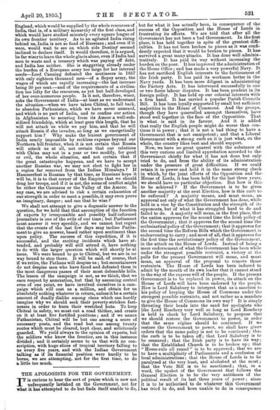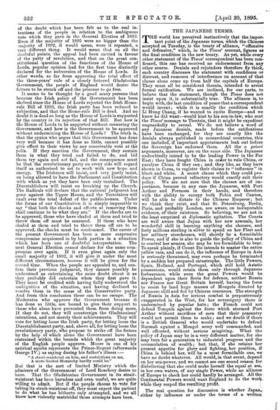THE APOLOGISTS FOR THE GOVERNMENT.
IT is curious to hear the sort of praise which is now not unfrequently lavished on the Government, not for what it has attempted to do but finds itself unable to do, but for what it has actually been, in consequence of the success of the Opposition and the House of Lords in frustrating its efforts. We are told that after all the Government has not been a bad Government. In the first place, it has held together in spite of the greatest diffi- culties. It has not been broken to pieces as it was confi- dently expected that it would be broken to pieces. It has. survived a great many attacks. It has done well adminis- tratively. It has paid its way without increasing the burden on the poor. It has improved the administration of the Home Office ; and has made a very powerful Navy. It has not sacrificed English interests to the factiousness of the Irish party. It has paid its workmen better in the Navy yards. It has been more diligent in administering the Factory Acts. It has intervened successfully in one or two fierce labour disputes. It has been prudent in its foreign policy. It has held up our colonial interests with a firm hand. It has carried a popular Parish Councils Bill. It has been loyally supported by small but sufficient majorities in the House of Commons. And the groups, though they have quarrelled amongst themselves, have stood well together in the face of the Opposition. That is what is said in its favour. And it is added that really the English people might do worse than con- tinue it in power ; that it is not a bad thing to have a Government that is not omnipotent ; and that a Liberal Government with a strong curb on it is just what, on the whole, the country likes best and should support.
Now, we have no great quarrel with the substance of this very curious and limited approbation accorded to the Government chiefly for what it has not done but only tried to do, and from the ability of its administration. under the pressure of great difficulties. If we could retain it in power and hold it in the same strong check in which, by the joint efforts of the Opposition and the- House of Lords, it has been held for the last three years, we should have no particular objection. But how is thin= tobe achieved ? If the Government is to be given another majority at the next Election, how is this curb to be enforced ? A majority means, and must mean, an approval not only of what the Government has done, while held in a vice by the Constitution and the strength of its opponents, but of what it has struggled hard to do and failed to do. A majority will mean, in the first place, that the nation approves for the second time the Irish policy of the Government ; that it approves for the second time the ecclesiastical policy of the Government; that it approves for the second time the Reform Bills which the Government is endeavouring to carry ; and most of all, that it approves for the first time the revolutionary policy of the Government, in the attack on the House of Lords. Instead of being a mere endorsement of what the Government has been while under the strongest possible restraint, a victory at the polls for the present Government will mean, and must mean, an approval of the proposal to remove those restraints. The House of Lords has been induced to admit by the mouth of its own leader that it cannot stand in the way of the express will of the people. If the present. Government is to be replaced in power, its attack on the House of Lords will have been endorsed by the people. How is Lord Salisbury to interpret that as a sanction to his policy of keeping the House of Commons under the strongest possible restraints, and not rather as a mandate to give the House of Commons its own way ? It is simply thrusting their heads into the sand for apologists who like Lord Rosebery very well so long as Lord Rosebery is held in check by Lord Salisbury, to propose that we should restore the Government to power, in order that the same regime should be continued. If wo restore the Government to power, we shall have give. orders that the same policy is not to be continued ; thm, the curb is to be taken off; that Lord Salisbury is to be censured ; that the Irish party is to have its way ; that the Established Church is to be broken up ; that " Home-rule all round " is to be approved ; that we are- to have a multiplicity of Parliaments and a confusion of local administrations ; that the House of Lords is to be paralysed at the very least, and abolished at the most ; that the Veto Bill is to be sanctioned ; that, in a word, the upshot of the Government that follows the General Election is to be the very antithesis of the political result of its last three years of power ; since it is to be authorised to do whatever this Government has tried to do, and been unable to do in consequence of the doubt which has been felt as to the real in- tentions .of the people in relation to the ambiguous vote which they gave in the General Election of 1892. Even if the majority of 1895 were no bigger than the majority of 1892, it would mean, were it repeated, a very different thing. It would mean that on all the doubtful points, the appeal had been carried in favour of the party of revolution, and that on the great con- stitutional question of the functions of the House of Lords, popular opinion had for the first time distinctly declared for the subversion of the House of Lords. In other words, so far from approving the total effect of the three-years' rule of a closely fettered Gladstonian Government, the people of England would desire the fetters to be struck off and the prisoner to go free.
It seems to be thought by a good many persons that because the Irish policy of the Government has been shelved since the House of Lords rejected the Irish Home- rule Bill of 1893, the Irish party has been reduced to subjection, and that the Home-rule Bill is dead. And no doubt it is dead so long as the House of Lords is supported by the country in its rejection of that Bill. But how is the House of Lords to be supported without censuring the Government, and how is the Government to be approved without undermining the House of Lords ? The truth is, that the cynics who argue that this Government has done very well because it has done so little, cannot possibly give effect to their views by any conceivable vote at the polls. If they sanction the Government, they sustain them in what they tried and failed to do, and bid them try again and not fail, and the consequence must be that the revolutionary party on every side will regard itself as authorised to set to work with new hope and energy. The Irishmen will insist, and very justly insist, on being allowed to have the Parliament and Constitution with which as yet they have been only tantalised. The Disestablishers will insist on breaking up the Church. The Radicals will declare that the national judgment has gone against the Upper House, and the Teetotalers will exult over the total defeat of the public-houses. Under the forms of our Constitution it is simply impossible to say "that both the checks and efforts at removing them shall continue to be what they are." If the checks are to be approved, those who have chafed at them and tried to throw them off must be censured. If those who have chafed at them and tried to throw them off are to be approved, the checks must be condemned. The career of the present Government has been a mere suspensive compromise acquiesced in by both parties in a situation which has been one of doubtful interpretation. The next General Election cannot declare for the same com- promise over again. If it even gives again only the small majority of 1892, it will give it under the most different circumstances, because it will be given for the second time. When the people are appealed to, and con- firm their previous judgment, they cannot possibly be understood as entertaining the same doubt about it as they probably did entertain when they first gave it. They must be credited with having fully understood the ambiguities of the situation, and having declined to resolve them in the sense of the Conservative party. And from this conclusion there can be no escape. The Moderates who approve the Government because it has done so little, are bound to give their support to those who alone have prevented them from doing more. If they do not, they will countersign the Gladstonians' intentions, and not merely their achievements. They will vote for letting loose the Irish party, for letting loose the Disestablishment party, and, above all, for letting loose the revolutionary party, wiio propose to strike off the fetters by the help of which alone the Government have been restrained within the bounds which the great majority of the English people approve. Moore in one of his satirical squibs represents the Prince-Regent (afterwards George IV.) as saying during his father's illness :- "A strait-waistcoat on him, and restrictions on me,
A more limited Monarchy hardly could be."
But that is the sort of limited Ministry which the admirers of the Government of Lord Rosebery desire to have. That the Gladstonian Government in its strait- waistcoat has been harmless and even useful, we are quite willing to admit. But if the people choose to vote for taking its strait-waistcoat off, they must expect the patient to do what he has hitherto only attempted, and we all know how violently matricidal those attempts have been.



































 Previous page
Previous page